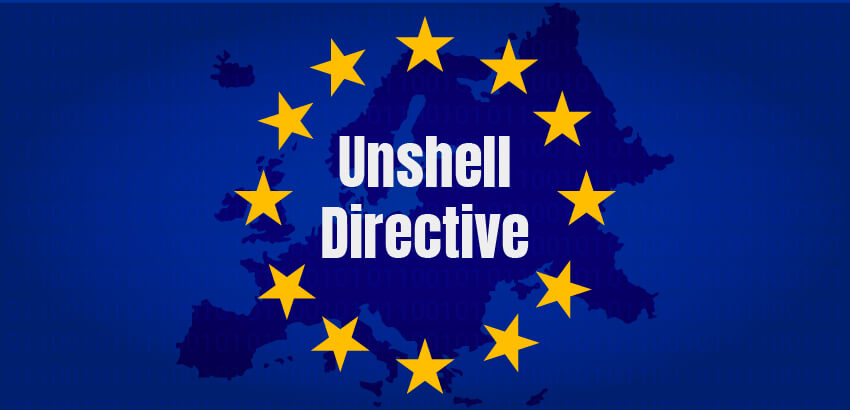Proposed “Unshell” Directive
The European Commission has presented its proposal for a new Directive laying down indicators of minimum substance for undertakings in Member States.
The proposed Directive aims to counteract the adverse effects of the COVID-19 pandemic in the European Union and intends to ensure adequate public revenues and the creation of an equitable and stable business environment within the European Union, whilst combatting aggressive tax planning structures.
In particular, the proposed Directive targets structures with no or minimal substance that are misused for obtaining tax advantages.
The “gateways” used to consider whether an entity falls within the scope of such Directive and reporting requirements are applicable, require that the following criteria are cumulatively met:
- more than 75% of the revenues accruing to the undertaking in the preceding two tax years is relevant income (i.e. passive income, securities, real estate, financial activities etc.);
- at least 60% of the undertaking’s relevant income is earned or paid out via cross-border transactions, or more than 60% of the book value of immovable property or movable property is located outside the member state of the entity in the preceding two tax years; and
- in the preceding two tax years, the administration of day-to-day operations and the decision-making on significant functions has been outsourced.
The Directive provides no guidance on the interpretation of such “gateways” and many points remain to be clarified, especially as regards the aspects of “outsourcing” – the Directive seems to target third party service providers providing administrative and directorship services, but it is unclear if the Directive would also apply to the outsourcing of services within group entities.
The Directive specifically excludes certain entities from the scope of application, such as:
- listed entities;
- regulated financial undertakings;
- entities of which the beneficial owners and their operational businesses are in the same member state;
- holding companies whose shareholder(s) or ultimate parent entity is in the same member state; and
- entities with at least five full-time equivalent employees or staff members exclusively generating the income.
It is not clear how certain entities, such as trusts, foundations, tax transparent entities will be classified for the purpose of applying the Directive.
The Directive moreover provides for minimum substance indicators, as follows:
- the undertaking has own premises in the Member State, or premises for its exclusive use;
- the undertaking has at least one own and active bank account in the European Union;
- One or more directors of the undertaking:
- are resident for tax purposes in the Member State of the undertaking, or
- at no greater distance from that Member State insofar as such distance is compatible with the proper performance of their duties;
- are qualified and authorised to take decisions in relation to the activities that generate relevant income for the undertaking or in relation to the undertaking’s assets and actively and independently use the authorisation on a regular basis; are not employees of an enterprise that is not an associated enterprise and do not perform the function of director or equivalent of other enterprises that are not associated enterprises; or
- the majority of the full-time equivalent employees of the undertaking are resident for tax purposes in the Member State of the undertaking, or at no greater distance from that Member States insofar as such distance is compatible with the proper performance of their duties, and such employees are qualified to carry out the activities that generate relevant income for the undertaking.
Entities meeting said criteria will be thought to have minimum substance criteria. Entities that are presumed not to have minimum substance shall be permitted to rebut this presumption by providing any additional supporting evidence of the business activities which they perform to generate relevant income.
An entity that will not be presumed to have minimum substance will not be able to issue a certificate of tax residence and shall longer benefit from any agreements and conventions that provide for the elimination of double taxation.
In practice, the entities will no longer benefit from the applicable of Double Tax Treaties, which in practice require the issuance of a tax residence certificate for application purposes. It is questionable, however, whether the dis-application of a DTT can validly be provided by virtue of a European Directive. Principal impact of not meeting the minimum substance requirements focus on the prohibition of applying the Parent-Subsidiary Directive and Interest-Royalties Directive, resulting in the imposition of income and withholding taxes at group level.
Note that Member States will have automatic access to information on shell entities from the automatic exchange of information under the Unshell Directive.
Penalties for infringements of the Directive are to be set by each of the Member States, and Member States shall ensure that those penalties include an administrative pecuniary sanction of at least 5% of the undertaking’s turnover in the relevant tax year, for non-compliance with reporting requirements applicable.
The proposed Directive is expected to significantly impact tax structuring alternatives that have been implemented for years through common holding company jurisdictions, such as Luxembourg, the Netherlands etc. It is recommended for clients to review their holding structures in light of the proposed Directive and to ascertain whether the gateways of the Directive are met or not or whether minimum substance requirements may need to be bolstered.
Magdalini Patiti & Partners Law Firm
8, Patriarchou Ioakeim Str., 106 74 Athens, Greece [email protected]
+30 213 033 9089, +30 213 033 9091 www.mpatiti.com

